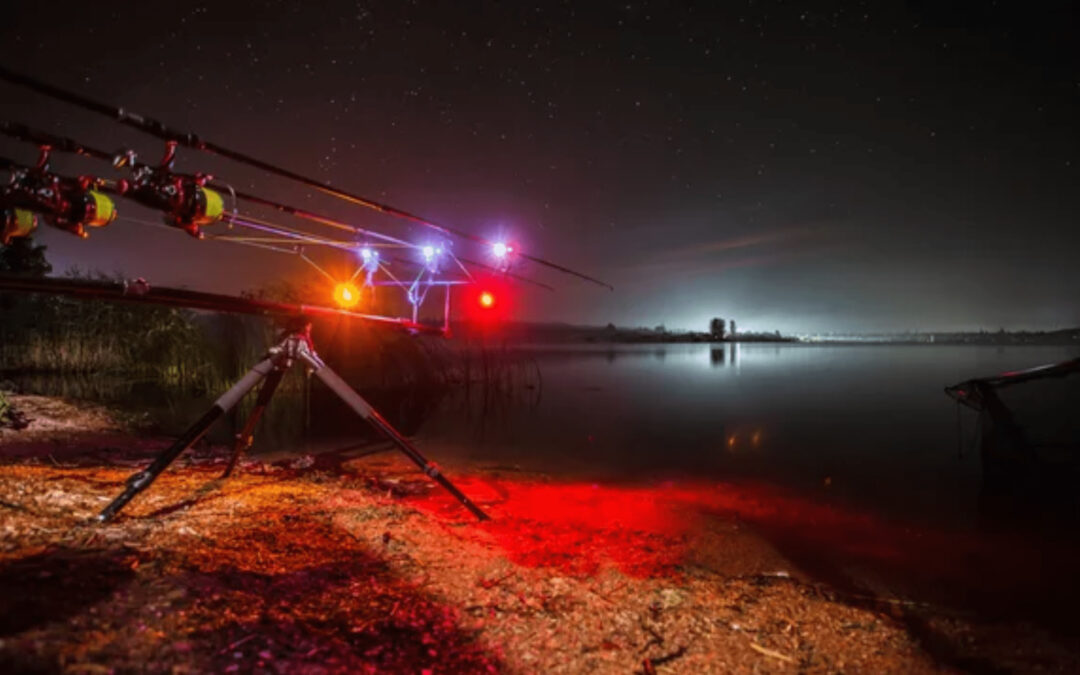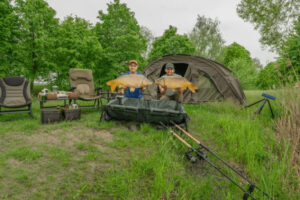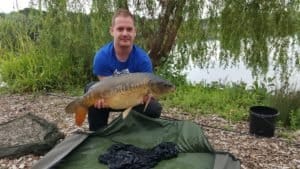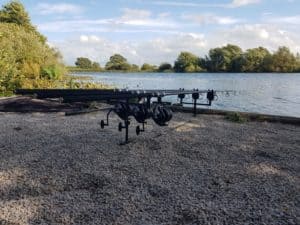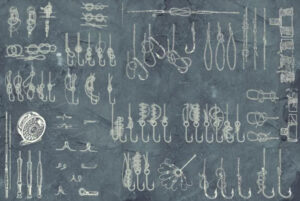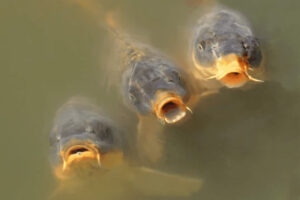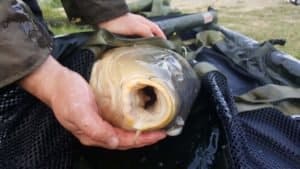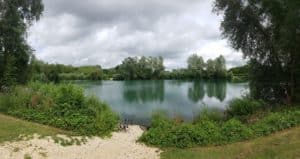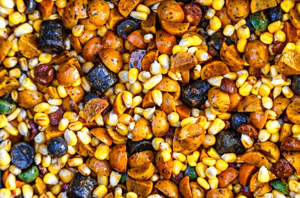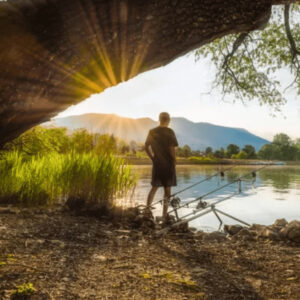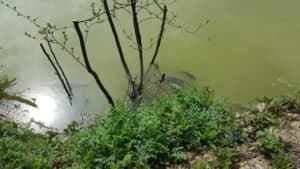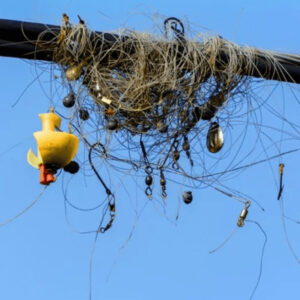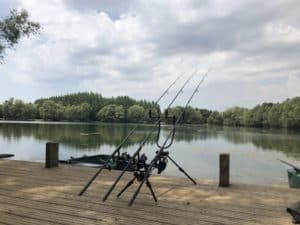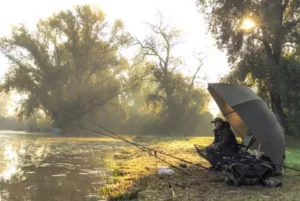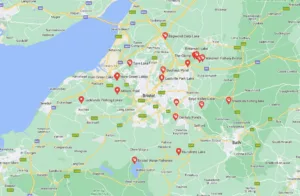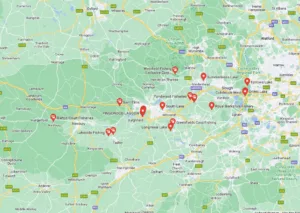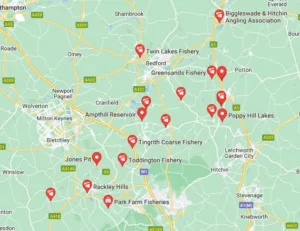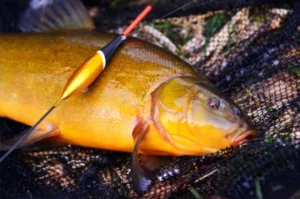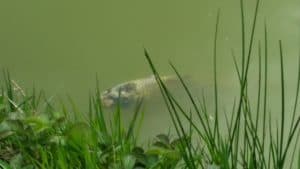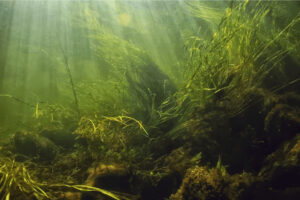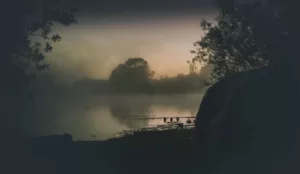Carp fishing at night can be a truly rewarding experience.
It is also one of the most challenging and exciting forms of angling.
Carp fishing at night has its own unique set of challenges, from finding the right spot to attract carp to dealing with the darkness and even potential predators.
With a bit of preparation, proper tackle, and technique, carp fishing at night can be a great way to increase your catch rate.
Cast accuracy is more difficult at night
If you get a fish at night, or your rig gets moved, it is a lot more difficult to put it back in the same spot at night.
For this reason, it’s important to use a distance marker in the direction of your spot.
It is also important to use distance sticks and a line clip to hit the right distance.
Alternatively, you could use a bait boat with a GPS to get it to the same spot every time.
What is the best bait for carp fishing at night?
Fishmeal and crustacean-based boilies give off a strong fishy scent and are packed with protein, making them the perfect carp food during the warmer months.
Other baits like pellet, paste, and maggots are ideal for catching carp in the dark since their strong smell makes them easier to find.
What time do carp feed at night?
Carp are most active during the night, and their feeding times depend on the weather conditions.
Carp feed more heavily in warmer waters when it is dark outside—especially on overcast days.
They tend to become less active once the sun rises, so focus you efforts during the earlier hours of darkness for better results.
Do carp go to deeper water at night?
Carp usually go to deeper water at night.
In the evening, they will often move into deeper sections of a lake or river to take advantage of cooler temperatures.
Carp may still be found in shallow waters during the night, so anglers should pay attention to changes in water temperature and depth when fishing for carp.
Is it worth night fishing for carp in winter?
Carp fishing during the winter months can be highly rewarding.
As water temperatures drop, carp become less active and will often move to deeper waters in search of food.
During this time, anglers should still use the same bait as they would during other times of the year.
Do you need a receiver for night fishing?
A bite alarm receiver can be a useful tool for carp fishing at night.
Bite alarm receivers are helpful because you can turn the alarm volume down and the receiver volume up.
This keeps the loud noises away from the lake where fish may be patrolling.
Why do people carp fish at night?
Carp fishing at night has become increasingly popular with anglers because it offers a few distinct advantages.
For one, carp are more active in the dark and therefore easier to catch.
Additionally, carp feed throughout the day and night, so there is always a chance of catching.
Where do carp go at night?
When the carp are close to the surface, they will look for any discarded bait that was thrown in by the anglers.
During the night, they will also try to locate food sources in weed edges and shallow waters.
Extra carp fishing equipment is needed for night fishing
When planning a carp fishing trip at night, it is important to keep in mind the extra gear needed.
A headlamp or flashlight is essential to help you move around the bank and bait your hook.
A landing net will also come in handy if you have one, as well as additional rods and reels for different presentations.
As far as bait goes, live or prepared baits such as boilies and particle baits work well for night fishing.
Additionally, it is a good idea to bring some snacks, drinks, and lights for your bivvy to keep yourself comfortable throughout the night.
I have a full guide for night fishing here.
Use the checklist below to make sure you take everything you need to be prepared.
Night Fishing Essentials Equipment
Bed Chair – You need one that is lightweight and folds, but also comfortable.
Bin Bags – Always take your rubbish with you.
Bivvy Or Brolly – Somewhere to keep out of the bad weather and to sleep.
Clothes – Spare clothes are useful to feel fresh.
Flask And Cups – Necessary for keeping warm in the cold weather.
Food And Drink – Packaged food if you don’t have a portable refrigerator.
Frying Pan And Pots – Only if you plan to cook, you’ll need cleaning stuff too.
Kettle – For tea, cleaning but also good for shrinkwrap.
Lighting For Bivvy – Magnetic lights or hanging lights, ideally USB.
Lighting For Rods – Lighting on a stand, ideally with a motion sensor.
Pillow – Fleece lined are normally the most comfortable.
Sleeping Bag – Buy a 5-season sleeping bag, nothing less.
Torch And Head Lamp – Ideally USB, and with a red torch option.
Nice To Have
Baby Wipes – To keep clean and to clean wounds.
Bivvy Table – Handy when tying rigs.
Bottled Water – For drinking, tea, and for showering.
Carp Barrow – Handy if you have a lot of gear, and so you can stay mobile.
Cooker Or Burner – Nice to have to stay warm.
Cutlery – Needed if you are doing any cooking.
Dab Radio – Nice to have, but keep the volume down.
Pop Up Shower Tent – Useful when you need privacy for showering and toilets.
Portable Shower – Now very cheap and useful for keeping fresh in the hot months.
Portable Toilet – Much nicer than most of the public toilets that everyone else uses.
Powerpack – For charging USB devices.
Toilet Roll – Just in case there is none, or if you have your own loo.
Towel – For frying off after a shower.
USB Solar Panel – To charge the powerpacks and USB devices.
Warm Clothes – For when the temperature drops.
Wash Bag – To keep your overnight gear together, plus your toothbrush.
Spare Stuff
Spare Batteries
Spare Fuel
Spare Net Handle
Spare Set Clothes
Spare Spools
Techniques for carp fishing at night
When it comes to carp fishing at night, presentation is key.
Slower, more subtle presentations can often be the most effective to attract carp in low light levels.
It is important to take your time when baiting up and preparing for a cast.
You should also consider shifting your focus from the surface of the water to slightly deeper areas near weed beds or underwater structures.
When choosing bait, smaller particles such as maggots or sweetcorn can be effective, as they will give off a scent that carp can sense even in the darkness.
If you are using boilies, it is best to make sure they are scented with a strong aroma so that carp can find them even at night.
Make sure you use bait that will stay on the hook all night.
Sweetcorn will likely come off over time, and pellets will break down.
This will leave you with a rig with no bait on. Use boilies overnight instead.
Night Fishing Tips
Some of the pressure lakes that are heavily fished during the day can switch on at night.
This allows you to catch fish at night.
Some of these lakes only feed at night, so you can get some good ones by fishing overnight.
The visibility of the fishing lines can be very challenging for fish to see.
During the day, they can enjoy basking in the sun and feeding at night.
When you wake up to a screaming bite alarm, it can be hard to determine where the noise is coming from, especially since the sky is pitch black.
Being organized and tidy is also important to have a successful night fishing experience.
Before you start fishing at night, make sure that you have the necessary equipment, such as a set of lights and a torch.
Although it may not be for heavy sleepers, night fishing can be a great option if you are able to get enough sleep. It’s also a great way to catch fish at night.
Keep Things Tidy
It can be very unsettling to wake up to a screaming bite alarm.
You have no idea what to do next as you try to get out of your sleeping bag, put on your shoes, and figure out which way to go.
I have had a few instances where I have had to rush out of my bivvy and run sideways as I couldn’t see the horizon.
Before you start moving out of your sleeping bag, make sure that you don’t get tripped up.
Having all of your gear, such as food, bags, and hooks, in your way can potentially cause you to get injured.
Before you go to bed, make sure that all of your bags are at the back of your bivvy.
Also, make sure that you have all of your equipment ready to go out, including your tools and rig components. In the dark, carrying out simple tasks can be very challenging.
Having all of your items organized before you start working can help make the process easier.
Set Up Lighting Before Dark
Having enough lights is also important to ensure that you have a successful night fishing experience.
Having enough light can help make the process easier and safer.
One of the worst things that can happen during a night fishing session is accidentally fumbling your way around the water while using your phone to light up the swim.
Amazon Prime has a wide variety of lighting options, and some of these are very affordable.
One of the best options that I have seen is a magnetic light that is attached to the ceiling of my bivvy, and a motion detector light that is placed on a stand by the rods.
These lights can even be charged using solar power.
A red-colored head torch is a better choice when it comes to playing with fish.
This will allow them to avoid getting spooked by a bright white light.
Today, most head torches and torch lights are made from LED bulbs, which are very energy-efficient.
They are also much brighter than their traditional counterparts.
One of the most important factors that you should consider when it comes to taking photos in the dark is having the proper lighting.
Having a head torch is not enough to light up your surroundings.
This type of light only needs to be on while you are taking a photo, and it will not upset anyone.
Having a good mosquito zapper is also a must-have item if you are planning on fishing in the bank.
Shelter For Night Fishing
The type of accommodation that you are staying in can also affect the way comfortable you will be during your overnight stay.
When it comes to choosing a bivvy, it is very important to make sure that you find one that will keep you warm during the winter.
A good shelter for night fishing can come in the form of air vents and groundsheets.
The Trakker Tempest V2 is a great choice for this type of fishing.
If you are not satisfied with the Trakker, there are other options available.
If you are planning on using a bivvy, make sure that you have some bank screws in it instead of the cheap thin tent pegs.
Also, sometimes, rubber mallets are needed to get the pegs in.
Be Set Up For Tea Or Coffee
Having the proper equipment and the ability to keep warm is also important to ensure that you are comfortable during your night fishing sessions.
A compact stove is also a must-have if you are planning on using a bivvy.
These types of cooking tools are very lightweight and can be easily stored in your tackle bag.
A good all-in-one set, which includes a knife and a cup, is also a must-have if you are planning on staying in a remote area.
This will allow you to have coffee or tea whenever you need it.
Tie Rigs In Advance
Getting the hang of the rigs at 3 in the morning is not fun, especially if a fish has already snapped your hook link.
Having the rigs tied in advance will allow you to quickly clip them onto your quick link.
Trying to tie rigs at 3 in the morning is not fun, especially if you are planning on fishing with two or three rods.
Not putting one of the rigs back in the lake because you were unable to tie them will almost certainly reduce your chances of catching a fish.
Using Glowsticks During Darkness
It can be hard to see your horizon marker when the sun is setting, especially during the evening.
The best horizon markers are usually visible during the day, but, in some cases, they can’t be seen at night.
One way to get around this issue is by walking around the lake and casting to the other bank with a glow stick.
This will allow you to cast to the other side of the lake instead of trying to figure out which tree to hit.
A set that includes glow sticks and bite alarms will allow you to customize the colors of the glow stick to specific spots.
If you are very organized, you can also use the bite alarms to match the glow stick’s color.
One of the most important factors that you should consider when it comes to carp fishing is the accuracy of your casting technique.
If you are not sure that the rigs are landing on the spot where you placed the bait, then you might be wasting money.
Clip Up For Distance
One of the most important factors that you should consider when it comes to carp fishing is the accuracy of your casting technique.
You should also be using line clips every time you cast.
One of the most effective ways to achieve this is by using distance sticks that are designed to help you land the right distance.
Also, make sure that you take the line out of the line clip before you set the rods down.
Without using horizon markers and distance sticks, you will not be able to get your rigs back on the spot where you placed the bait.
Prepare To Catch Fish
Before you start fishing, make sure that you have the necessary materials in your bags.
One of the most important factors that you should consider is the availability of your other equipment.
This will allow you to quickly retrieve the various items that you need to get the job done.
When fish are out of the water, you have to work quickly to return them back to the lake as fast as possible.
Having the right equipment will allow you to do this efficiently.
Many fishing rods have tips that have broken off due to faffing around and being unorganised.
Glowing Bite Indication
If you have a Delkim bite alarm, then you should consider investing in a Nitelite bite indicator.
This will allow you to monitor the movement of the bite indicator as it moves around to indicate if the fish is a hooked one or a liner.
If you don’t have a Delkim or can’t afford to buy a Nitelite, then you can attach the isotope to your bite alarms.
Conclusion
Carp fishing is a fantastic way to spend time outdoors in nature and catch some big carp along the way.
To get the most out of your carp fishing experience, make sure you are properly prepared with the right equipment, including rods, reels, lines, clips, and lures.
Additionally, horizon markers and distance sticks can help improve your accuracy when casting.
Finally, attach an isotope to your bite alarm so that you can quickly identify and retrieve the fish that has taken your bait.
With these tips in mind, you will be sure to have a successful and enjoyable carp fishing experience.
FAQ
What type of equipment should I bring for carp fishing at night?
When carp fishing at night, you should bring a set of rigs, glow sticks, bite alarms, distance sticks, and horizon markers. This will ensure that you are able to cast accurately and retrieve the fish quickly. You should also bring a knife and a cup for making coffee or tea in the early morning hours.
How do I set up a horizon marker?
To set up a horizon marker, you will need to attach the line to an anchor point on the bank. You can then place a float or buoy at the other end of the line that will act as your visual reference when casting. Be sure to tie knots securely and attach the line to the float or buoy. Finally, attach the other end of the line to a large weight at the anchor point. This will help keep your horizon marker in place.
What is a distance stick?
A distance stick is a tool that helps you measure and cast accurately to specific distances around the lake. It is made up of a long pole with sectional markings and clips at either end. You can use it to measure the distance you need to cast, then attach your rigs using the clips. This will allow you to accurately land your bait at various distances around the lake.
What is an isotope?
An isotope is an LED light attached to a bite alarm that glows when it detects a bite. This helps you identify the fish so you can retrieve them quickly, and it also adds an element of fun to your fishing experience. You can buy ready-made isotopes or make your own using glow sticks.
What are some night carp fishing tips?
When it comes to carp fishing, some tips include using the right gear and equipment, including suitable rods, reels, lines, clips and lures. You should also use horizon markers and distance sticks to ensure accuracy when casting. Finally, make sure your rigs are landing on the spot where you placed the bait; if not then you might not be catching any fish. Lastly, make sure you have an isotope attached to your bite alarm so that you can quickly identify and retrieve the hooked fish.
Related Articles
I have made a lot of mistakes during my fishing sessions and don’t want you to make the same mistakes. I’ve learned the hard way over 20 years of fishing most weekends, testing, tweaking, and testing again and now want to help you excel with your carp fishing.
If you need any help, you can reach me at Fishing Again’s Facebook page
Last Updated on January 31, 2024 by Shane

